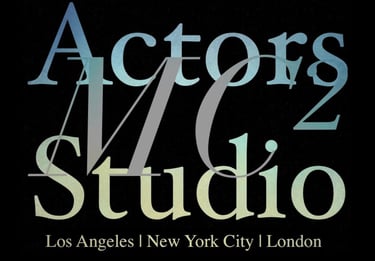What The F#(% Am I Doing?!


What The F#(% Am I Doing?!
by Mario A. Campanaro
I received a call from an actor referred to me by a long-time private client’s manager. From the moment we started speaking, I could tell she was an actor who deeply respected the art form. Her voice conveyed a burning hunger that I personally love to work with and witness—something that pushes an actor to dig deeper and deeper into their craft. We both agreed it would be a good fit, and my assistant scheduled an appointment for us to meet for a session two days later.
It became immediately clear that, alongside her talent, she possessed amazing instincts and intuition, qualities that had carried her this far in her career. She had experienced a lot of success on several TV shows and was now being given the rare opportunity to bring her gifts to the stage in a city known for its high standards. She had signed all the contracts, and within the year, she would be playing a very complex role in a two-and-a-half-hour drama. And yes, she would have to do it eight shows a week.
There would be no “Action!” or “Cut!” There would be no “Reset and do it again!” And, of course, there would be no editor to fix any mistakes or piece together the best takes to create the perfect performance. Instead, there would only be her, her ensemble, the set, the props, the lighting, the sound, the arc laid out by the text, a huge audience who paid a hefty ticket price to watch her live for two and a half hours, eight shows a week. There would also be critics on opening night, deciding whether the show would succeed or fail. In short, there would be nowhere to hide. No one and nothing to hide behind. There would be no stopping and starting over. No safety net. The show would happen in real time, with the stakes as high as they could possibly be. That’s the beautiful, thrilling danger of theater life.
Theater is the actor’s true home, demanding their talent and technical accountability to make it through, living moment to moment in such a challenging process. So, you can imagine the panic in her voice when she shared, “I just don’t know what the f#(% I’m doing! I mean, I have my instincts and impulses, but I don’t know if I can trust them. Are they my instincts based on the circumstances of my own life, or are they instincts based on the character’s life? I just can’t get there on my own! I still take class. I’ve literally taken class all over this city, but most of them don’t ask for any real preparation or text analysis, so I can’t even practice that skill. I get these notes, but sometimes I have no idea what they mean. And within a lot of the class setups, I’m tentative about speaking up or questioning these notes because I don’t want to ruffle anyone’s feathers or challenge the ‘training.’ But shouldn’t these notes make sense if they’re being given to an actor? Shouldn’t I know what I’m doing by now? Sometimes I feel like I depend on luck for things to go well. Sometimes I’m in it, and sometimes I’m not. Even when my work goes well, I have no idea how I got there. I always seem to have a ‘breakthrough’ when I get these random adjustments, but I have no idea if the adjustment has anything to do with the circumstances of the text. And I don’t know how to use what just happened without being handed the adjustment again to get the ‘breakthrough.’ I leave feeling great about the ‘breakthrough’ because I’m told it’s a breakthrough, but I don’t really know what I just broke through. I’m literally addicted to adjustments to get these ‘breakthroughs’ and discover some kind of opening, but I’m not sure if it’s related to the life of the character based on the text. It’s like I’m always being directed, rather than learning what the hell I’m doing! And I want to know what the f#(% I’m doing! I feel so damn stuck! I’m actually a little angry that I’ve spent this amount of time and money on classes, and now, with this opportunity coming up, I’m still in this position. I feel absolutely lost! That’s why I’m here now. I’m scared to death to do the very thing I love. How the hell am I supposed to do this show eight shows a week? Why did I say ‘yes’ to this? I’m honestly terrified!”
After our first session, I asked if it would be okay to dedicate the studio’s next blog to this subject and share her story anonymously, knowing she wasn’t alone in this predicament. She agreed, as long as I promised to help her “find her way out of this predicament.” I made her that promise with a smile and a firm handshake and told her I was honored to be part of her team.
Unfortunately, this is not an isolated conversation. I’m disheartened as I meet more and more actors who reveal how distraught they are about not getting this “thing” they seem to be searching for, knowingly or unknowingly. Despite reading countless acting books, analyzing award-winning performances, attending workshops, and jumping from one studio to the next, they still feel something is missing. They’re left with a large question mark about what they truly love about acting.
So what’s missing? Without hesitation, I can tell you: Craft.
No matter the time or age we live in, despite the changing styles of acting, the fundamentals of acting and humanity remain the same. The actor’s job is to portray life in its true nature, based on the given circumstances, self-awareness, environment, relationships, and needs. The actor must navigate obstacles in order to improve those circumstances, making choices that align with the text to achieve those needs and experience life through the character’s pursuit of peace, happiness, success, health, love, or whatever is indicated by the text. Talent emerges through the actor’s choices, bringing the character’s world to life without it seeming like acting. What you know in life, the character must also know. All that known makes the unknown of the moment possible. Without that, you’re telling your own story, swimming in a pool of who knows what.
Actors need tools that support them physically, mentally, emotionally, and even energetically. Just as a ballet dancer must understand the technicalities of their craft to perform complex moves, an actor needs a set of tools to do their work. To live in the spontaneity of the unknown moment, an actor must also be aware of what is known in order to make the unknown possible.
The perfect test of an actor’s ability is whether they can do a two-and-a-half-hour show, eight times a week, with a consistent, alive, uninhibited, organic, fresh, and visceral performance—plus the vocal and physical stamina to keep telling the story truthfully using their instrument based on the structure of the text. Can they sit at a table with an actor they respect and be available to work with them?
And let’s be clear: This is not just for the theater. Any actor with talent, sophistication, know-how, and dependability will have a long career, whether in stage or screen. As I always tell my students and clients, “An actor who is always working is an actor who has always done the work.”
So, here is my answer to this unfortunate dilemma: How do you live from moment to unknown moment, grounded in the circumstances of the text? Craft. How do you listen and respond to the filtered wants and needs that drive your character forward? Craft. How do you actively live your character’s arc? Craft. How do you get from one point to the next in the text? Craft. How do you establish relationships with others and the environment that help move the story forward? Craft. How do you discover your character’s physical, behavioral, and vocal attributes? Craft. How do you make your lines have intention and drive your character’s circumstances forward? Craft. How do you give birth to your lines organically? Craft. How do you understand the moments between the lines? Craft. How do you bring your character to life using your life experiences, research, exploration, imagination, and playfulness as your instrument? Craft. How do you perform a two-and-a-half-hour show, eight shows a week? By being supported by your craft!
If you are still saying, “I don’t know what the f#(% I’m doing!” it’s time to take a stand, speak up, and take action for yourself because you deserve the clarity you’re seeking—not just as an actor, but as an artist. You need to know what you’re learning. The whole point of learning a craft is so you don’t need someone to guide you to the answers—you know how to get there when left to your own devices. If your training isn’t preparing you for the demands of the business, how is it serving you?
You can learn something from everyone, but it must be tangible, human-sensible, and testable in the mirror of life itself. If you can’t see it in life, how can it serve you as an actor? Acting is not mystical or intangible. You have the right and obligation as an actor to have a set of tools that will always support you in your creative endeavors. And there is no one singular way to get there, but there is a way. A way that resonates with and stimulates your instrument to do honest, active, exciting, human work in relation to the circumstances at hand, ensuring that the quality of your work remains consistent—not dependent on luck. It supports you in your knowing, and therefore, in your freedom within the unknown moment.
This is the craft you want to cultivate. This is the craft that never fails you. It always has your back. The craft you can refine, mix, match, and always know you’re supported in finding your way. This is the craft that allows you to throw caution to the wind, dissolve fear, and fall back in love with the process of acting once again.
A practiced actor is a prepared actor. And a prepared actor is prepared because of what they’ve practiced.
Copyright © 2025 Mario A. Campanaro, All rights reserved.


